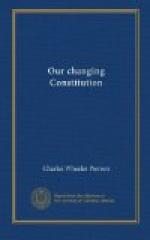The evils of child labor have long engaged the attention of philanthropists and lawmakers. In comparatively recent years child labor laws are said to have been enacted in every state of the Union. These statutes, however, lacked uniformity. Some of them were not stringent enough to satisfy modern sentiment. Moreover, commercial considerations entered into the reckoning. Industries in states where the laws were stringent were found to be at a disadvantage in comparison with like industries in states where the laws were lax, and this came to be regarded as a species of unfair competition. The advantages of uniformity and standardization seemed obvious from both the philanthropic and the commercial viewpoints, and Congress determined to take a hand in the matter.
No well-informed person supposed for a moment that the regulation of child labor was one of the functions of the General Government as those functions were planned by the makers of the Constitution. The United States Supreme Court had declared over and over again that such matters were the province of the states; that “speaking generally, the police power is reserved to the states and there is no grant thereof to Congress in the Constitution."[1] For some years, however, Congress had been finding ways to legislate indirectly upon matters which it had no power to approach directly. Under the grant of power in the Constitution “to regulate commerce with foreign nations and among the several States,"[2] Congress had enacted laws purporting to regulate commerce but in reality designed for the suppression or regulation of some other form of activity. These enactments had for the most part been sustained as constitutional by the Supreme Court (though with misgivings and sharp differences of opinion), the Court holding that it could not pass on the motives for congressional action. The enactment of a law regulating child labor seemed therefore but another step along a trail already blazed, and Congress determined to take that step.
[Footnote 1: Keller v. United States, 213 U.S., 138.]
[Footnote 2: Art. I, Sec. 8.]
The statute enacted by Congress[1] prohibited transportation in interstate commerce of goods made at a factory in which, within thirty days prior to their removal therefrom, children under the age of fourteen years had been employed or permitted to work, or children between the ages of fourteen and sixteen had been employed or permitted to work more than eight hours in any day, or more than six days in any week, or after the hour of 7 P.M. or before the hour of 6 A.M. The constitutionality of the act was at once challenged and suit brought to test the question. The Supreme Court held, by a vote of five to four,[2] that Congress had overstepped its power. The previous decisions which had upheld somewhat similar inroads on the police power of the states were distinguished and the act was declared unconstitutional.




